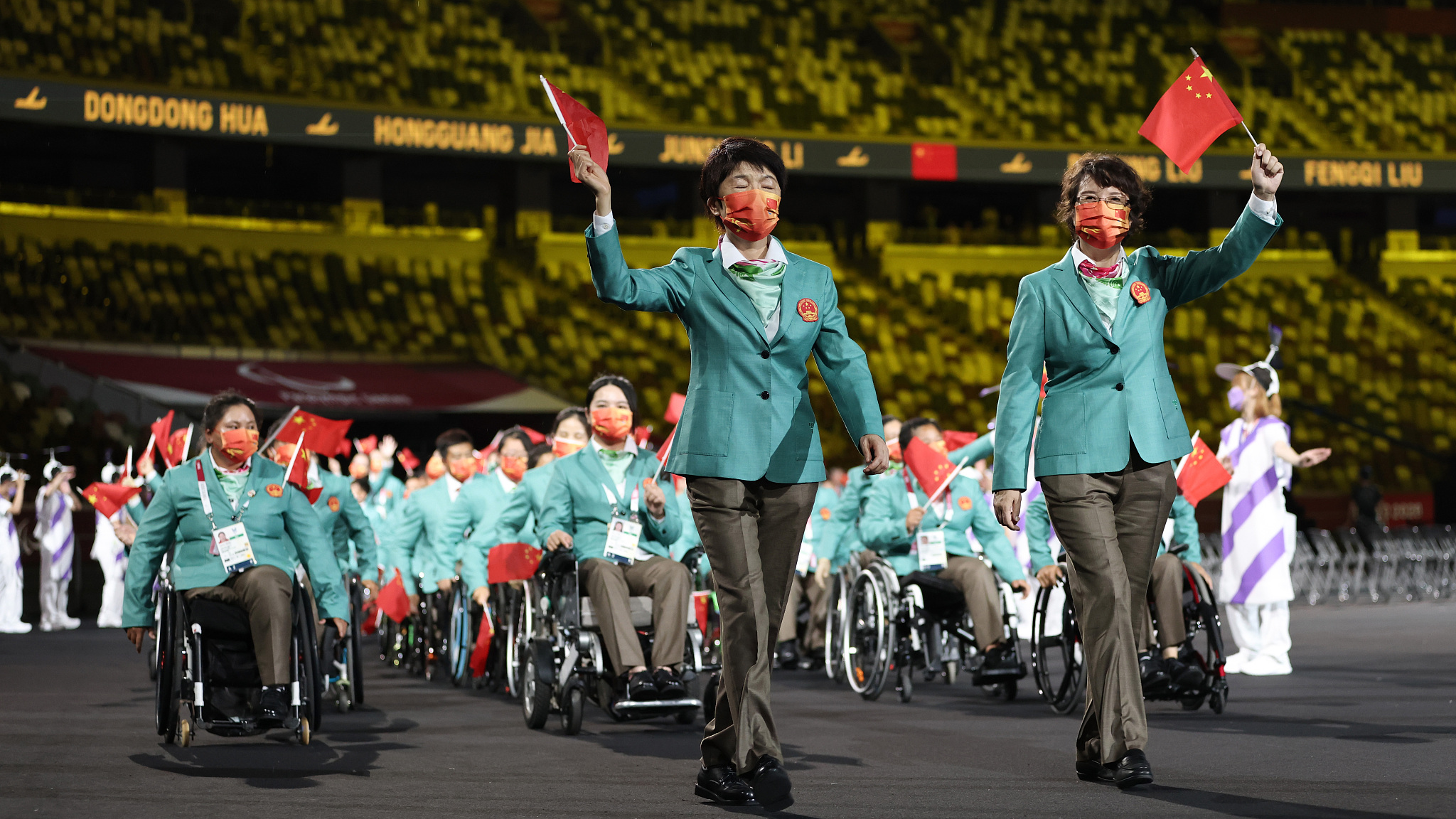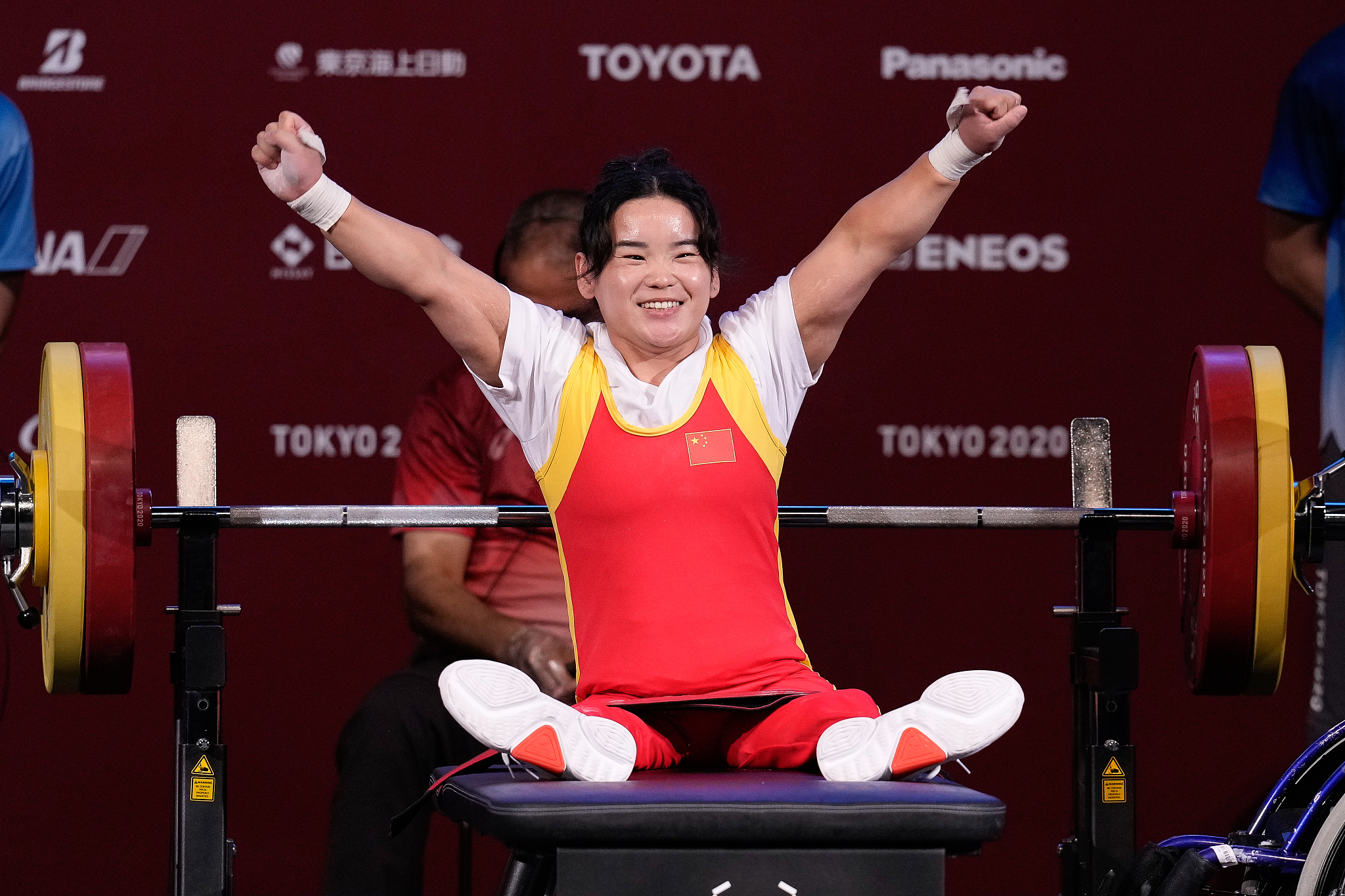
Team China at the opening ceremony of the Tokyo Paralympics in Tokyo, Japan, August 24, 2021. /CFP
Team China at the opening ceremony of the Tokyo Paralympics in Tokyo, Japan, August 24, 2021. /CFP
Editor's note: Timothy Kerswell is a research fellow at the Chinese University of Hong Kong (Shenzhen). He lived in Macao for seven years, working as an assistant professor at the University of Macao. The article reflects the author's opinions and not necessarily the views of CGTN.
China's performance at the 2021 Tokyo Paralympics was exceptionally good. China's athletes earned 207 medals, 96 of them gold which was substantially better than the second ranked the United Kingdom (124 medals, 41 gold). This performance, the nation's best ever at the Paralympic Games, raises the question of life with disability in China, and the progress the country is making on that front. Gold medals are certainly tremendous achievements, and China's athletes should be celebrated for their success. But beneath the glamor of the Olympic games is an important story of overall social progress.
An important part of China's promotion of the rights of people with disabilities is its legal framework and this begins from the apex of China's legal system. China is one of the few countries in the world where disability rights are addressed as part of the constitution which was framed in 1982. Article 45 of the Constitution of the People's Republic of China states that "The state and society shall assist arrangements for the work, livelihood and education of citizens who are blind, deaf, mute or have other disabilities."
This was followed up by the Law of the People's Republic of China on the Protection of Disabled Persons which was enacted in 1990 and provides the basic framework for disability policy in China. It provides a strong commitment that both the state and society have a number of responsibilities toward people with disabilities.
These include rehabilitation of acquired disabilities, and the promotion of education and employment, welfare measures and a built environment conducive to the active participation of people with disabilities in national life. In July this year, a white paper by the State Council Information Office noted that China has published about 90 laws and 50 administrative regulations concerning the protection of the rights and interests of people with disabilities.
With these ambitious goals in mind, it is worth considering the scale and scope of what was proposed. The most recent survey of disability in China was carried out in 2007 which estimated China had about 82.96 million people living with a disability. In other words, it's reasonable to assume that China today has at least 100 million people who have some kind of disability.
To adequately address the policy challenge of disability, China required three fundamental things: firstly an economic base which would provide the state and the society with the resources to address these problems; secondly, an ideological approach which has the ability to put people before profit; and thirdly institutional arrangements to push for and implement pro-disability policies.

Guo Lingling of China wins the Tokyo Paralympics powerlifting women's 41-kilogram in Tokyo, Japan, August 26, 2021. /CFP
Guo Lingling of China wins the Tokyo Paralympics powerlifting women's 41-kilogram in Tokyo, Japan, August 26, 2021. /CFP
While China has always possessed the ideological resolve to address questions of social inclusion and has important groups in its political system devoted to disability questions, it is no surprise that its recent progress on the question of disability issues coincides with the maturation of China's economic expansion.
One of China's more notable recent achievements has been its anti-poverty drive. A major part of this was targeted assistance for people with disabilities including living allowances and subsidies, and the guarantee of up to 15 years of free education as of 2020. Policy measures like these go a long way to ensuring independence and social inclusion, and it's estimated that these measures lifted approximately 7 million people with disabilities out of poverty and into the moderate prosperity that China's citizens now enjoy.
This is not to suggest that there are no challenges. China's policy community certainly acknowledges that the promotion of disability rights is an ongoing challenge, and there are many areas for improvement. China generally understands rights as a set of goods that can be continually expanded over time as society develops, as opposed to the Western approach which tends to see rights as abstract absolutes.
There are examples of the social use of language about people with disabilities that demonstrate both the progress that has been made but also the ongoing challenges in terms of educating the society toward the goal of social inclusion. The historical use of the term 残废 cán fèi (crippled) was supplanted by 残疾 cán jí (deformed) which is in relatively common social use today.
The China Disabled Persons' Federation has been strenuously arguing in favor of the more neutral term 残障 cán zhànɡ (obstructed) to reflect the social nature of disability, and an understanding that the experience and overall happiness of people with disabilities is largely determined by the social context, rather than the medical consequences of the disability itself.
Challenges like these in the sphere of language reflect the challenges that exist in the broader society. However, what needs to be acknowledged is the progress that China has made in the area of disability rights. China's recent success at the Tokyo Paralympic Games is a crowning achievement, but it's just a small part of a very long story of progress.
(If you want to contribute and have specific expertise, please contact us at opinions@cgtn.com.)

